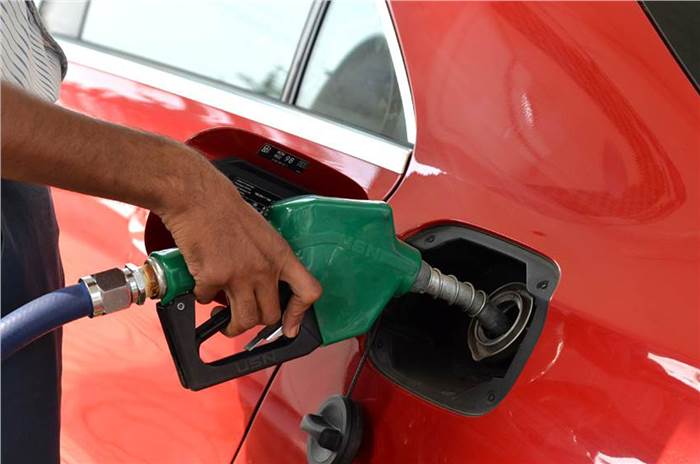October has dawned and with it comes another hike in fuel prices. Between yesterday and today, petrol price in Mumbai has risen by 24 paise a litre and that of diesel by 32 paise. Today’s fuel prices – Rs 107.95 per litre for petrol and Rs 97.84 per litre for diesel – are the highest yet in Mumbai and also India.
- Petrol, diesel prices have increased by more than Rs 20 from October 2020
- Taxes comprise 55 and 50 percent of petrol, diesel price, respectively
- Petrol, diesel taxes are huge revenue sources for central/state government
Price increment over the last 18 months
Seen over a period of 12 months – from October 1, 2020, to today, October 1, 2021 – petrol has become more expensive by Rs 20.41 a litre and diesel by Rs 20.91 in Mumbai. And seen over a period of 18 months – from April 1, 2020, when BS6 emission norms kicked in – petrol is dearer by Rs 32.67 a litre and diesel by Rs 32.65.
Of the four metros, motorists in Mumbai pay the most for their choice of fuel while Chennai motorists pay the least for petrol (thanks to a recent Rs 3 a litre VAT price cut by the state government) and Delhiites pay the least for diesel.
Taxes account for majority of petrol, diesel prices
Last month the GST Council did not take any decision to bring these fuels under its purview. That means motorists continue to pay wallet-busting prices to run their vehicles, unless they are using CNG or have made the shift to electric.
As of today (October 1), in Delhi, petrol costs Rs 101.89 a litre, of which 32.28 percent (Rs 32.90) comprises excise duty and 23 percent (Rs 23.51) is State VAT (Value Added Tax). Club the two taxes and motorists are paying Rs 56.41 or 55.36 percent of each petrol litre as tax.
As for diesel which cost Rs 88.62 a litre, the excise duty component is Rs 31.80 or 35.26 percent, while VAT is Rs 13.19 or 14.62 percent of the retail price. Together, the two taxes account for Rs 44.99 or nearly 50 percent of the price a motorist pays to tank up on diesel.
Rational behind high taxes on petrol, diesel
In FY2021, the Centre received Rs 3,34,894 crore excise duty from petrol and diesel. As Autocar Professional's Murali Gopalan wrote recently in his fuel pricing analysis, from the Centre’s point of view, it is only too well known that petrol and diesel account for a significant part of its revenue streams, more so at a time when GST collections are little to write home about.
States are also financially fragile, which also puts in perspective the imperatives of levying value-added tax on auto fuels. While everyone is busy mopping up revenue during a difficult COVID-19 period, it is the customer who is suffering silently.
There is also the case of the government – both Centre and states – aggressively driving the adoption of electric vehicles and electric mobility. While a number of states including Delhi, Maharashtra, Tamil Nadu, Telangana, Rajasthan, Assam and Kerala have introduced subsidy and incentive-laden EV policies, the government's recently announced PLI Scheme for India Auto Inc, with an outlay of Rs 26,058 crore, has given a huge fillip to the EV industry.
Also See:



Comments
Member Login
Personal Details
No comments yet. Be the first to comment.